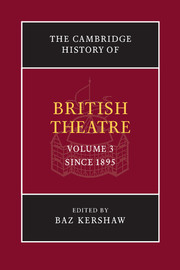Book contents
- Frontmatter
- Part I 1895–1946
- Part II Scottish and Welsh Theatres, 1895–2002
- Part III 1940–2002
- 13 British theatre, 1940–2002: an introduction
- 14 The establishment of mainstream theatre, 1946–1979
- 15 Alternative theatres, 1946–2000
- 16 Developments in the profession of theatre, 1946–2000
- 17 Case study: Theatre Workshop’s Oh What a Lovely War, 1963
- 18 1979 and after: a view
- 19 British theatre and commerce, 1979–2000
- 20 New theatre for new times: decentralisation, innovation and pluralism, 1975–2000
- 21 Theatre in Scotland in the 1990s and beyond
- 22 Theatre in Wales in the 1990s and beyond
- 23 English theatre in the 1990s and beyond
- Bibliography
- Index
- References
21 - Theatre in Scotland in the 1990s and beyond
from Part III - 1940–2002
Published online by Cambridge University Press: 28 March 2008
- Frontmatter
- Part I 1895–1946
- Part II Scottish and Welsh Theatres, 1895–2002
- Part III 1940–2002
- 13 British theatre, 1940–2002: an introduction
- 14 The establishment of mainstream theatre, 1946–1979
- 15 Alternative theatres, 1946–2000
- 16 Developments in the profession of theatre, 1946–2000
- 17 Case study: Theatre Workshop’s Oh What a Lovely War, 1963
- 18 1979 and after: a view
- 19 British theatre and commerce, 1979–2000
- 20 New theatre for new times: decentralisation, innovation and pluralism, 1975–2000
- 21 Theatre in Scotland in the 1990s and beyond
- 22 Theatre in Wales in the 1990s and beyond
- 23 English theatre in the 1990s and beyond
- Bibliography
- Index
- References
Summary
This is about more than our politics and our laws. This is about who we are, how we carry ourselves.
(First Minister Donald Dewar MP, MSP, at the state opening of the Scottish Parliament, 1 July 1999)Scottish theatre in the late twentieth century was a vital, challenging and diverse cultural industry. It was an active participant in a period of huge social, cultural and legislative change, reacting to the election of Tony Blair’s New Labour government and the devolution referendum in 1997, followed two years later by the election campaign in Scotland and the opening of the first Scottish parliament for 292 years. In a country with a population of a little over 5.1 million, a parliament in Edinburgh made government a more tangible and personal thing than ever before – Scotland’s politicians were more accountable and the electorate more involved in the processes of government. As a consequence of the constitutional changes within the nation, the ‘imagined’ nature of Scotland also changed. Scottish culture had been much preoccupied with issues of colonialism, marginalism and parochialism, but in a context where at least some aspects of political independence had been achieved, the dynamic shifted from aspiration and desire to definition and responsibility.
Writing for the Scotsman in the aftermath of the devolution referendum, Scotland’s leading playwrights, David Harrower and David Greig, were challenged by the creative potential of this new environment:
Scotland has voted to redefine itself as a nation. To redefine ourselves we need to understand ourselves, exchange ideas and aspirations, confront enduring myths, expose injustices and explore our past. The quality, accessibility and immediacy of Scottish theatre make it one of the best arenas in which these dialogues can take place.
- Type
- Chapter
- Information
- The Cambridge History of British Theatre , pp. 470 - 484Publisher: Cambridge University PressPrint publication year: 2004
References
- 1
- Cited by

